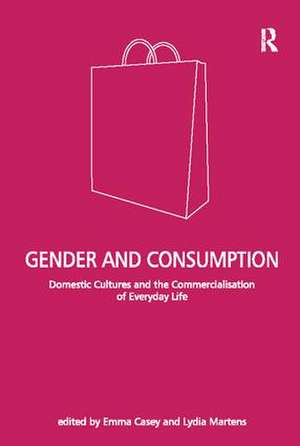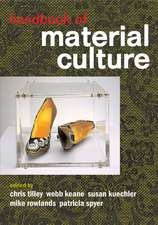Gender and Consumption: Domestic Cultures and the Commercialisation of Everyday Life
Editat de Lydia Martens, Emma Caseyen Limba Engleză Paperback – 24 mai 2017
Preț: 312.43 lei
Preț vechi: 356.64 lei
-12% Nou
Puncte Express: 469
Preț estimativ în valută:
59.79€ • 62.19$ • 49.36£
59.79€ • 62.19$ • 49.36£
Carte tipărită la comandă
Livrare economică 14-28 aprilie
Preluare comenzi: 021 569.72.76
Specificații
ISBN-13: 9781138099173
ISBN-10: 1138099171
Pagini: 256
Dimensiuni: 156 x 234 x 23 mm
Greutate: 0.45 kg
Ediția:1
Editura: Taylor & Francis
Colecția Routledge
Locul publicării:Oxford, United Kingdom
ISBN-10: 1138099171
Pagini: 256
Dimensiuni: 156 x 234 x 23 mm
Greutate: 0.45 kg
Ediția:1
Editura: Taylor & Francis
Colecția Routledge
Locul publicării:Oxford, United Kingdom
Notă biografică
Emma Casey is Senior Lecturer in Sociology in the Faculty of Arts and Social Sciences, Kingston University, UK. Lydia Martens is Senior Lecturer in Sociology, School of Criminology, Education, Sociology and Social Work, Keele University, UK.
Recenzii
’This interdisciplinary and feminist collection of essays, offering historical and ethnographic insights into women's relationships to consumption, enlivens our understanding of the commercialization of domestic space and of women's lives. The writers in this volume give women's actual practices of consumption the scholarly attention they deserve.’ Jennifer Scanlon, Bowdoin College, USA ’This fascinating and varied collection of multidisciplinary essays brings a much needed gendered perspective to the study of consumption, drawing on the feminist tradition of work on women's domestic practices as well as contributing to debates on consumer culture. The essays offer fresh, new and empirically grounded insights into the practice and meanings of consumption in everyday life.’ Stevi Jackson, University of York, UK
Cuprins
Introduction, Emma Casey, Lydia Martens; Part 1 The Commercialisation of Domestic Life in Historical Perspective; Chapter 1 Class, Gender and Domestic Consumption in Britain 1920-1950, Judy Giles; Chapter 2 The Feminist and the Cook: Julia Child, Betty Friedan and Domestic Femininity, Joanne Hollows; Chapter 3 Gender and the Destalinisation of Consumer Taste in the Soviet Union Under Khrushchev, Susan E. Reid; Part 2 Private/Public Dynamics in Gender and Consumption; Chapter 4 Making Sameness: Mothering, Commerce and the Culture of Children’s Birthday Part Ies, Alison J. Clarke; Chapter 5 Perceptions of Commercialised Social Introduction Services Amongst Women, Jacqueline Davidson; Chapter 6 Consuming Pleasure on the Wedding Day: The Lived Experience of Being a Bride, Sharon Boden; Chapter 7 Gambling and Everyday Life: Working Class Mothers and Domestic Spaces of Consumption, Emma Casey; Chapter 8 Gender, Class, Emotional Capital and Consumption in Family Life, Elizabeth B. Silva; Part 3 Gender and the Material Culture of the Domestic Sphere; Chapter 9 The Sensory Home as a Site of Consumption: Everyday Laundry Practices and the Production of Gender, Sarah Pink; Chapter 10 Consumption and Sexual Intimacy: Towards an Understanding of Intimate Cultures in Everyday Life, Dana Wilson-Kovacs; Chapter 11 Gender at Play: Décor Differences Between Boys’ and Girls’ Bedrooms, Irene Cieraad Gender, Consumer Culture and Promises of Betterment in Late Modernity, Lydia Martens, Emma Casey;
Descriere
Through a variety of case studies (such as gambling, wedding day consumption and bedroom décor), this volume provides a unique insight into women’s domestic consumption. The essays demonstrate the broad range of experiences that domestic consumption offers women and reveal some of the complex meanings and motivations underpinning women’s consumption practices.




















